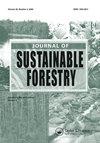Fine root turnover law and influencing factors in forest ecosystem
IF 1.8
4区 农林科学
Q3 FORESTRY
引用次数: 0
Abstract
Root turnover is a key process of terrestrial ecosystem carbon cycle, which is of great significance to the study of soil carbon pool changes and global climate change. However, because there are many measurement and calculation methods of root turnover, the results obtained by different methods are quite different, and the current research on root turnover of forest ecosystem on the global regional scale is not sufficient, so the change law of root turnover of global forest ecosystem is still unclear. By collecting literature data and unifying the calculation method of turnover rate, this study integrates the spatial pattern of fine root turnover of five forest types in the world, and obtains the factors affecting fine root turnover of forest ecosystem in combination with soil physical and chemical properties and climate data. The results showed that there were significant differences in fine root turnover rate among different forest types, and it gradually decreased with the increase of latitude; the turnover rate of fine roots in forest ecosystem is positively correlated with annual average temperature and annual average precipitation; fine root turnover rate of forest ecosystem is positively correlated with soil organic carbon content, but negatively correlated with soil pH value. This study provides a scientific basis for revealing the law and mechanism of fine root turnover in forest ecosystem.森林生态系统细根更替规律及其影响因素
根系周转是陆地生态系统碳循环的关键过程,对研究土壤碳库变化和全球气候变化具有重要意义。然而,由于根系周转量的测量和计算方法较多,不同方法得到的结果差异较大,目前在全球区域尺度上对森林生态系统根系周转量的研究还不充分,因此全球森林生态系统根系周转量的变化规律尚不清楚。本研究通过收集文献资料,统一周转率的计算方法,整合世界五种森林类型细根周转量的空间格局,结合土壤理化性质和气候数据,得到森林生态系统细根周转量的影响因素。结果表明:不同林型间细根周转率存在显著差异,随纬度的增加而逐渐降低;森林生态系统细根周转率与年平均气温、年平均降水量呈正相关;森林生态系统细根周转率与土壤有机碳含量呈正相关,与土壤pH值呈负相关。本研究为揭示森林生态系统细根更替的规律和机制提供了科学依据。
本文章由计算机程序翻译,如有差异,请以英文原文为准。
求助全文
约1分钟内获得全文
求助全文
来源期刊

Journal of Sustainable Forestry
Social Sciences-Geography, Planning and Development
CiteScore
3.90
自引率
12.50%
发文量
42
期刊介绍:
Journal of Sustainable Forestry publishes peer-reviewed, original research on forest science. While the emphasis is on sustainable use of forest products and services, the journal covers a wide range of topics from the underlying biology and ecology of forests to the social, economic and policy aspects of forestry. Short communications and review papers that provide a clear theoretical, conceptual or methodological contribution to the existing literature are also included in the journal.
Common topics covered in the Journal of Sustainable Forestry include:
• Ecology, management, recreation, restoration and silvicultural systems of all forest types, including urban forests
• All aspects of forest biology, including ecophysiology, entomology, pathology, genetics, tree breeding, and biotechnology
• Wood properties, forest biomass, bioenergy, and carbon sequestration
• Simulation modeling, inventory, quantitative methods, and remote sensing
• Environmental pollution, fire and climate change impacts, and adaptation and mitigation in forests
• Forest engineering, economics, human dimensions, natural resource policy, and planning
Journal of Sustainable Forestry provides an international forum for dialogue between research scientists, forest managers, economists and policy and decision makers who share the common vision of the sustainable use of natural resources.
 求助内容:
求助内容: 应助结果提醒方式:
应助结果提醒方式:


